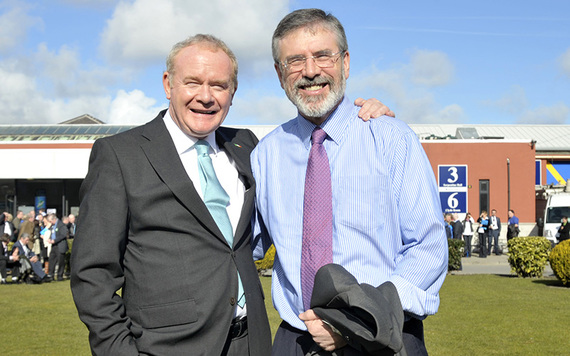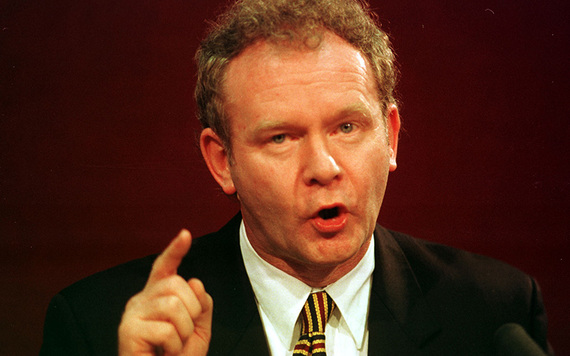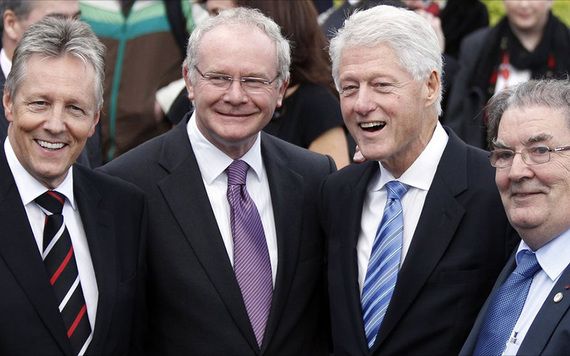Former President Bill Clinton will attend the funeral of Sinn Fein leader Martin McGuinness in Derry on Thursday, sources tell IrishCentral.
The former president had a close bond with McGuinness, built up over the years of working together on the Peace Process. McGuinness, a frequent visitor to the White House in the Clinton era, stated on numerous occasions that the Peace Process would not have succeeded without Clinton.
Tony Blair too, had a close relationship with McGuinness as the yworked together on the peace process.The funeral mass for Martin McGuinness will be held tomorrow, Thursday, 2pm, in his native Derry, and a massive crowd of mourners is expected, including dignitaries from the US, South Africa, Britain, and the Irish Republic.
The funeral mass for Martin McGuinness will be held tomorrow, Thursday, 2pm, in his native Derry, and a massive crowd of mourners is expected, including dignitaries from the US, South Africa, Britain, and the Irish Republic.
He passed away early on Tuesday morning, at Derry's Altnagelvin Hospital surrounded by his family, following a short illness.
Martin McGuinness took part in two of the most iconic moments in recent Irish history during his time as a leader of Sinn Fein.
In the first, in 2007, he embraced long-time hard line unionist rival the Reverend Ian Paisley and forged a consensus on how to govern Northern Ireland through power-sharing.
Then, in 2012, he met with Queen Elizabeth during a trip she made to Belfast in his capacity as the North’s deputy first minister.

Martin McGuinness shakes the hand of Queen Elizabeth.
There is no question that only McGuinness could have carried off both acts without causing a major split within the republican movement. Publicly embracing former enemies like Paisley and the Queen was the most delicate of tightrope acts, yet somehow McGuinness managed to pull it off.
It was a measure of the man that he and Paisley ended up known as the Chuckle Brothers, both conceding nothing about the past, but accepting that the only hope for the future was a joint working relationship that produced positive results.

Ian Paisley and Martin McGuinness, jokingly dubbed the "Chuckle Brothers".
Only McGuinness would have been able to cross that massive political divide. It was a tribute to his humanity and political skill that he pulled it off.
Indeed, one of the most iconic moments of his career was his attendance at the funeral of Paisley in 2014. The broad acceptance of McGuinness by the Paisley family recently included a fulsome paean of praise from Ian Paisley Junior.
If Mandela had de Klerk, then Northern Ireland had Paisley and McGuinness, the two men who broke every historical precedent and learned to work together, joyously even.
Before McGuinness met the Queen, there were warnings that it was a step too far and that his republican movement would inevitably split. As the very embodiment of British rule in Ireland, the Queen represented all that was hostile to Irish nationalists for centuries.
Yet somehow McGuinness climbed that barrier too, and his gracious acceptance of the invitation to meet the Queen played a huge role in bedding down the power-sharing government in the North.
Where did this great skill to negotiate with his enemies come from? McGuinness could not even claim a Republican background, but he grew up in Derry, a city so gerrymandered that the minority Protestant population continuously held power over the Catholics and let them know all about it every July 12.
When the dam burst and Bloody Sunday in Derry happened in 1972 McGuinness became the leader of his people, a youth barely out of his teens, yet the most fearsome IRA commander in Northern Ireland.
McGuinness never regretted his stand against British troops in his home city after Bloody Sunday. His membership of the IRA was always a badge of honor for him.

A young Martin McGuinness as a commander in the IRA.
He and Gerry Adams changed the history of the islands of Ireland and Britain by persuading the IRA to take the political path despite grave warnings that peace could not be achieved, and that men like Michael Collins had died trying to achieve the same.
The companionship and energy between Adams and McGuinness was the critical factor in the rise of Sinn Fein, to the point where they are on the cusp of power in Northern Ireland as the largest party, and are one of the three largest parties in the Irish Republic.

Sinn Fein leaders Martin McGuinness and Gerry Adams.
The turn away from the gun may seem logical now, given the massive success of the peace process, but it took a huge undertaking and life-threatening bravery for McGuinness and Adams to achieve it.
Fortunately, the Americans, in the person of President Bill Clinton and Irish American activists, were on hand to help the process achieve fruition. In one of his last videos, McGuinness specifically thanked those Irish Americans who had made a profound difference and ensured the success of the peace process.
It is fitting to note that one of his last visitors was Senator George Mitchell, who played such an outstanding role in achieving the Good Friday Agreement.

Sinn Fein has lost a great leader, a great Irishman, and a fearless defender of his own people.
Martin McGuinness’s work is done, but his memory and achievements will last forever and always be synonymous with peace in Ireland. May he rest in peace.




Comments